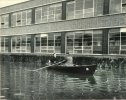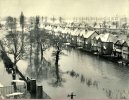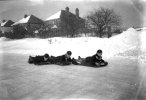this very cold snap with no snow as yet has made me wonder how people managed during the bad winters of 47 and 63 things like getting to work and school and trying to keep homes warm...i was not born in 47 but at the age of 10 i well remember the winter of 63...i think to us kids it was just a great deal of fun but no doubt it was our parents who had the worry of heating and being able to buy food...until i watched the below footage i had no idea just how bad things were and even worse in the rural parts of the country...it would be interesting to read our members memories of these bad winters..
-
Welcome to this forum . We are a worldwide group with a common interest in Birmingham and its history. While here, please follow a few simple rules. We ask that you respect other members, thank those who have helped you and please keep your contributions on-topic with the thread.
We do hope you enjoy your visit. BHF Admin Team
You are using an out of date browser. It may not display this or other websites correctly.
You should upgrade or use an alternative browser.
You should upgrade or use an alternative browser.
THE WINTERS OF 47 AND 63
- Thread starter Astoness
- Start date
oldMohawk
gone but not forgotten
I saw both those winters and have previously commented about them ... they were winters you don't forget ...
In the winter of 1947 I don't remember ever having a day off from school because of snow and remember trudging to Aldridge Rd school through two foot of snow with a blizzard blowing snow across the fields. The heating in the school had failed so we had to wear our damp overcoats in class. I also thought it was normal to have frost on the inside of bedroom windows.
In the winter of 1963, which was the worst for 200 years, There was frozen sea, frozen rivers, underground water pipes to our houses frozen solid and electrical welding equipment needed to unfreeze the pipes. Coal shortages led to electric power cuts. A three day thaw at the end of January led us to think the 'big freeze' was ending but no, the freeze came back with a vengeance and lasted until the end of March. I remember skating on the pool in Dartmouth Park West Bromwich when the ice was 3ft thick.
In the winter of 1947 I don't remember ever having a day off from school because of snow and remember trudging to Aldridge Rd school through two foot of snow with a blizzard blowing snow across the fields. The heating in the school had failed so we had to wear our damp overcoats in class. I also thought it was normal to have frost on the inside of bedroom windows.
In the winter of 1963, which was the worst for 200 years, There was frozen sea, frozen rivers, underground water pipes to our houses frozen solid and electrical welding equipment needed to unfreeze the pipes. Coal shortages led to electric power cuts. A three day thaw at the end of January led us to think the 'big freeze' was ending but no, the freeze came back with a vengeance and lasted until the end of March. I remember skating on the pool in Dartmouth Park West Bromwich when the ice was 3ft thick.
Bob Davis
Bob Davis
Only in Birmingham for 47 winter and can concur with everything OM says. Used to walk along Chester Road from Court Lane to Green Lanes school through snow 2ft deep and drifts along side at shoulder height. No days off , frozen milk no heating damp clothes, deliveries of milk and food regularly late. Chester Road partially cleared, but most lorries had chains on their tyres. 1963 lived in Plymouth which rarely saw snow but we did that year, my wife was a teacher at a school in a city boundary estate, Dartmoor one mile away, but no days off buses kept running, life went on a6lmost as normal.I saw both those winters and have previously commented about them ... they were winters you don't forget ...
In the winter of 1947 I don't remember ever having a day off from school because of snow and remember trudging to Aldridge Rd school through two foot of snow with a blizzard blowing snow across the fields. The heating in the school had failed so we had to wear our damp overcoats in class. I also thought it was normal to have frost on the inside of bedroom windows.
In the winter of 1963, which was the worst for 200 years, There was frozen sea, frozen rivers, underground water pipes to our houses frozen solid and electrical welding equipment needed to unfreeze the pipes. Coal shortages led to electric power cuts. A three day thaw at the end of January led us to think the 'big freeze' was ending but no, the freeze came back with a vengeance and lasted until the end of March. I remember skating on the pool in Dartmouth Park West Bromwich when the ice was 3ft thick.
Bob
Pedrocut
Master Barmmie
There is an existing thread that has post on the 47 and 63 winters…
Weather : past adverse weather in Birmingham
The winter of 1947 was really grim. Cold and snow, shortage of fuel, electricity and gas weren't always on and no wireless during the day. School was closed, and I was horrified to hear on the wireless at home when it was working that even London was isolated from our home for a few days, but...
birminghamhistory.co.uk
Richard Dye
master brummie
That could be quite possible back then. I do not think they were using winterized fuels and depending upon the grade of diesel fuel the viscosity can be very problematic in very cold weather.Can remember 1963. Was on a (diesel) train and it stalled as the diesel fuel was too thick (or at least that was what we were told)
oldbrit
OldBrit in Exile
I well remember the SMOG thas is not what we called it then, but that's what it was in the winter you could not even see in front of you I have walked in front of Dad's car to lead him home from Smethwick to Yardley. I have walked along the street feeling my way along walls to get home. Coal burning in the winter was deadly
hi phil i cant recall having time off school in 63...even though i think back then schools were closer than some are today we trudged through the deep snow to school and sat in our coats if it was too cold...we had a fairly long kitchen and used a paraffin heater to try and keep that warm ..i can still smell that paraffin now...no heating at all in the bedrooms and attic and no fitted carpets either... and provided the coal man could deliver we could only afford to light the coal fire in the front room...very rarely did we have a fire on the go in front and back rooms. because my 6 year old grandson is interested in history .i was telling him about how life was back then and he is convinced i lived on another planetI saw both those winters and have previously commented about them ... they were winters you don't forget ...
In the winter of 1947 I don't remember ever having a day off from school because of snow and remember trudging to Aldridge Rd school through two foot of snow with a blizzard blowing snow across the fields. The heating in the school had failed so we had to wear our damp overcoats in class. I also thought it was normal to have frost on the inside of bedroom windows.
In the winter of 1963, which was the worst for 200 years, There was frozen sea, frozen rivers, underground water pipes to our houses frozen solid and electrical welding equipment needed to unfreeze the pipes. Coal shortages led to electric power cuts. A three day thaw at the end of January led us to think the 'big freeze' was ending but no, the freeze came back with a vengeance and lasted until the end of March. I remember skating on the pool in Dartmouth Park West Bromwich when the ice was 3ft thick.
lyn
Last edited:
mw0njm.
A Brummie Dude
most of the fuel used was gas oil very dirty and contained water so it froze. most vehicles and fuel tanks had fuel heaters to try and stop it freezing but it still froze. we lived in aston and had to walk to school in nechells no buses. the snow was piled up by the side of the rd with gaps to walk through here and there, by the time we got to school we was wet and cold then we had to sit in a class room with hats and coats on arguing who was sitting by the rads. the milk come at break and it was partly froze it would not go up the straws you had to drink it out the bottle as it thawed in you hands after school we went on the cut it was froze solid and you could walk over to the power station and have a good mooch around it was closed down in parts, when back home the fun started sliding own the hill on the peck and sledges were knocked up from bits of old wood scrounged. the house was not too cold we had coal fires in bedrooms and burned offcuts of wood from the wood yard opposite us.
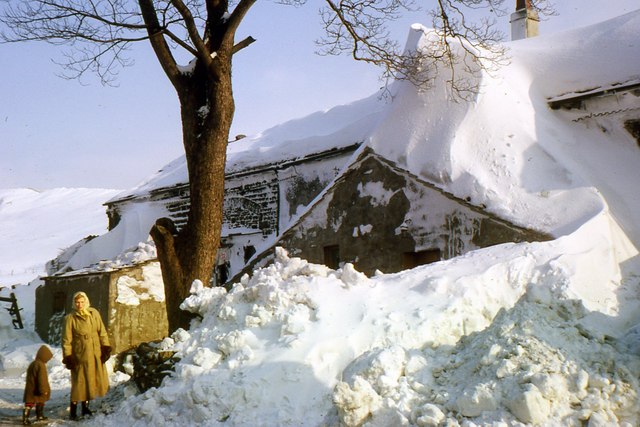
 www.rmets.org
www.rmets.org

The Big Freeze of 1963: One of the coldest winters on record
One of the coldest winters on record
Stokkie
master brummie
I was 7 in 1963. I developed bronchitis. In Smethwick there was yellow smog which I can smell and even taste if I think about it. We had a coal fire. On the plus side the snow was deep in Warley Woods. I have asthma these days, but didn't suffer from it as a child, but the industrial pollution and coal fires may have taken a toll. Flannelette sheets on the beds and layers of blankets. Unheated bedroom of course.
A Sparks
master brummie
I remember the winter of 62/63, I had just started senior school in the September. I had to walk to Perry Barr to get the number 11 bus through the snow.
I guess schools didn't close then as most families didn't have a telephone and there was no other means of contact other than a letter so you just had to make your way there!
I guess schools didn't close then as most families didn't have a telephone and there was no other means of contact other than a letter so you just had to make your way there!
I remember both very well. I remember in 1947 when Dad opened the back door there was just a wall of snow up to the top where the snow had drifted and we had to break our way through. As already said, we still had to go to school and because rather poor neither my brother or myself had wellingtons so feet got rather wet. Dad had to buy himself a pair because he had to walk to work from Erdington to the BSA'
In 1963 I was living on the outskirts of Tadcaster in Yorkshire and had to visit many of the villages round there. Some of the drifts were 10 ft. high. Whilst we were all fed up with it we still got on with life.
If we get another one like I wonder just how folk will react today. Probably blame it on the government
In 1963 I was living on the outskirts of Tadcaster in Yorkshire and had to visit many of the villages round there. Some of the drifts were 10 ft. high. Whilst we were all fed up with it we still got on with life.
If we get another one like I wonder just how folk will react today. Probably blame it on the government
devonjim
master brummie
I am old enough to remember both, in 47 I was at infants school, our classroom was separate from the main school which was a bonus as it had a coke burner so coats could be dried by piling on the fireguard, schools didn't close as most, including teachers lived locally and we could and did walk to school routinely. I confess wasn't keen on playing out in the snow, why would I want to be cold and wet.
Home heating was a coal fire in the front room, we hadn't heard of lounges. There was a coal fired water boiler in the bath room, water heated and then transferred by bucket into the bath which had a cold tap only.
By 63 I was in my early twenties, I have a memory of hiring a couple of land rovers and driving off for a weekend in Peak District, Alstonefield, to go tobogganing, I worked in Hockley Heath where there was a lake that became popular for skating/sliding in the lunch hour, don't remember not going into work, wasn't something you did.
Domestic heating was a prepayment electric fire in the main room and a coke burner in the kitchen which heated house water, not central heating, two of the bedrooms had heaters, one gas, one electric I think but they were rarely used.
A thought, we didn't have mould in houses in those days.
Home heating was a coal fire in the front room, we hadn't heard of lounges. There was a coal fired water boiler in the bath room, water heated and then transferred by bucket into the bath which had a cold tap only.
By 63 I was in my early twenties, I have a memory of hiring a couple of land rovers and driving off for a weekend in Peak District, Alstonefield, to go tobogganing, I worked in Hockley Heath where there was a lake that became popular for skating/sliding in the lunch hour, don't remember not going into work, wasn't something you did.
Domestic heating was a prepayment electric fire in the main room and a coke burner in the kitchen which heated house water, not central heating, two of the bedrooms had heaters, one gas, one electric I think but they were rarely used.
A thought, we didn't have mould in houses in those days.
Last edited:
Covroad
master brummie
I can remember in the 63 freeze using the tray from the bottom of the gas oven as a sledge to go down Hobmoor Hill on, the corner of Hobmoor Road and Heybarnes Road had all the snow cleared from Hobmoor Road (to allow the buses to operate) was piled up on the corner , so we would aim at that to stop us somehow we could get three of us on the tray . The speed we got to was frightening and no real steering apart from sticking your feet out. I would get in my house soaking and frozen but it was great fun.
I remember 1947, we lived in a bungalow in the middle of the staffordshire moorlands, when we woke the bungalow was snowed in, Dad tried to clear a path but it was too big a task. Fortunatley neighbouriing farmers came to our rescue and dug a path from the lane to our front door.
oldMohawk
gone but not forgotten
A 1947 scene
And during the snowiest winter I remember scenes like this ...

Covroad
master brummie
yes the school milk would freeze and expand and the frozen milk would push the tin foil tops off the bottles.most of the fuel used was gas oil very dirty and contained water so it froze. most vehicles and fuel tanks had fuel heaters to try and stop it freezing but it still froze. we lived in aston and had to walk to school in nechells no buses. the snow was piled up by the side of the rd with gaps to walk through here and there, by the time we got to school we was wet and cold then we had to sit in a class room with hats and coats on arguing who was sitting by the rads. the milk come at break and it was partly froze it would not go up the straws you had to drink it out the bottle as it thawed in you hands after school we went on the cut it was froze solid and you could walk over to the power station and have a good mooch around it was closed down in parts, when back home the fun started sliding own the hill on the peck and sledges were knocked up from bits of old wood scrounged. the house was not too cold we had coal fires in bedrooms and burned offcuts of wood from the wood yard opposite us.

The Big Freeze of 1963: One of the coldest winters on record
One of the coldest winters on recordwww.rmets.org
oldMohawk
gone but not forgotten
In 1947 we used half an Anderson shelter with 10 on board to sledge here. Luckily we never hit a car! Dragging it back up the hill kept us warm.
My winter sledging was done where this pic is. We used to come down Sandy Lane on the left and whizz straight over the main road to go down Chelmorton Road on the right. Not many cars around in those days so we survived !

I remember one Christmas day when it was so foggy we could not see across roads.
oldMohawk
gone but not forgotten
When the large amount of snow melted in 1947 we had floods.
In 1947 the Walsall Road in front of Tucker Eyelets factory flooded from the River Tame when all the snow thawed. The now picture still shows the Tucker factory but the land in front of the houses on the right has become the other side of a dual carriageway. Interesting sky in the now picture and the bus stop has a shelter.
Then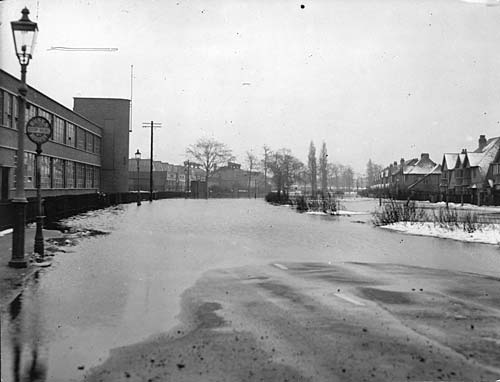
Now[/TD]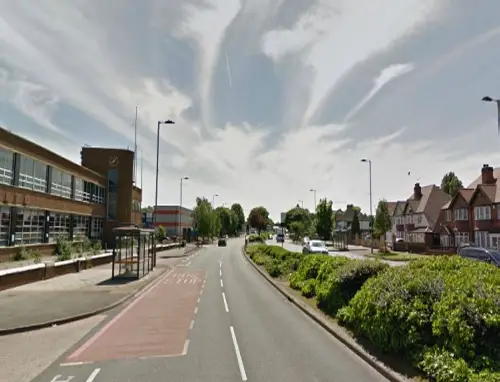
A Sparks
master brummie
My Dad worked at Tuckers!1947 floods on the Walsall Road Perry Barr
Some folk borrowed a boat from nearby Perry Barr park and had fun ...
View attachment 176015
The people living in the houses on the right did not have fun.
View attachment 176016
The floods from the Tame happened in later years too, my junior school friend lived in that section of Walsall Road and she remembered their house being flooded downstairs.
Chunky AC
master brummie
My earliest memories were of the snow, in 1947, and dad chasing me around the kitchen table, all wrapped up in our coats and scarfs. Mom was in hospital following the birth of my younger brother. Dad did not light the coal fire he was trying to preserve the stock we had for when mom came home with the new baby.
In 1963 I had my first car a 1937 Morris 8 four door, on loan from older cousin. At the height of the coldest days it was the only car in the street that started thanks the the cranking handle and squirt of aether into the air intake.
I also remember the Smogs It would have been before 1963 because I was on a bicycle, the fog was so thick I had to walk from Six ways Aston to Witton island down Witton Road. Just passed the library a stationary number 5 bus was parked the driver unable to to see the kerb asked if I could walk in the gutter and he would just follow me. I completed my good deed for the day when the driver parked up at Witton island outside the Co-op and said that was as far as he was driving that day. The few remaining passengers had to get off and walk the rest of the way home. The memories are so vivid, again thank you BHF for rekindling them.
In 1963 I had my first car a 1937 Morris 8 four door, on loan from older cousin. At the height of the coldest days it was the only car in the street that started thanks the the cranking handle and squirt of aether into the air intake.
I also remember the Smogs It would have been before 1963 because I was on a bicycle, the fog was so thick I had to walk from Six ways Aston to Witton island down Witton Road. Just passed the library a stationary number 5 bus was parked the driver unable to to see the kerb asked if I could walk in the gutter and he would just follow me. I completed my good deed for the day when the driver parked up at Witton island outside the Co-op and said that was as far as he was driving that day. The few remaining passengers had to get off and walk the rest of the way home. The memories are so vivid, again thank you BHF for rekindling them.
Chunky AC
master brummie
Great picture with lots of atmosphere , in the years before long trousers I used to hate getting “Chaps on my legs”. Sore fingers and thumbs were cured with “Melrose,“ It’s still available today but unfortunately no longer. 1/3d that’s one shilling and three pence.January/February 1947, Chester Road/A452 in Streetly, the hill beyond the Parson & Clerk, as you go up towards Brownhills.
Yours truly, nearly 11, in BVGS black and white scarf (and short trousers, natch!), with two friends. A great day - remember it well!
Chris
View attachment 176017
Stokkie
master brummie
In 2017 the Environment Agency completed flood gates at Witton and built a bund, a retaining bank to stop the River Tame flooding. The flood defence works continued to March 2022. After the bund was constructed, I took a party of students along the river to Perry Park and they were astonished at how near the river was to the Perry Barr One Stop shopping centre. It took a long time, but the local houses and factories should be safer now.1947 floods on the Walsall Road Perry Barr
Some folk borrowed a boat from nearby Perry Barr park and had fun ...
View attachment 176015
The people living in the houses on the right did not have fun.
View attachment 176016
The memory in words........January/February 1947, Chester Road/A452 in Streetly, the hill beyond the Parson & Clerk, as you go up towards Brownhills.
Yours truly, nearly 11, in BVGS black and white scarf (and short trousers, natch!), with two friends. A great day - remember it well!
Chris
View attachment 176017
WINTER 1947
Here are I and a couple of friends on the Chester Road in Streetly, on the hill leading up from the Parson & Clerk towards the Manor Road crossroads. (I'm on the right, in BVGS black-and-white scarf and short trousers). Great fun and an improvement over the normal venue which was Manor Road. Only interrupted by the occasional vehicle for which we of course had to keep a look out and give way to. Very little, though.
I knew the family in the house in the background, the father a survivor of Dunkirk; they had moved in during the previous year after he was demobbed and now, like everyone in that row of houses which included my own, they were no doubt desperately trying to keep the chill out of their homes, struggling with condensation on their single-glazed windows, at best just streaming down the glass every morning or, more probably wholly iced up. Virtually no loft insulation, no snugly fitting, double-glazed windows, certainly no cavity wall foam, no central heating, just open fires or paraffin stoves or electric fires - if you could afford to keep them running. What an ordeal it must have been for the grown-ups, especially the old or the poorly or the hard-up. Not for us kids, though. Or at least, not today. Clear sky, sun and sheet ice everywhere.
At one stage, up from the Parson & Clerk, came roaring an open military jeep, the driver huddled in gaberdine, muffler and large gauntlets. An angry man with a swarthy complexion and a strange accent – he didn't look British at all and may have been, possibly, American or European. He harangued us for several minutes in no uncertain terms, pointing out the dangers and so on. We absorbed his message, looked suitably remorseful, watched him finally roar off on his journey northwards and then of course returned to our fun.
Over the following days and weeks snow and ice remained everywhere but the traffic on the Chester Road slowly returned and the wonderful white, compacted surface grew harder and grittier and blacker. Finally it was 2 or 3 inches thick, like a layer of sooty, impenetrable concrete. And of course wholly useless for toboganning.
Eventually a team of POWs appeared and inched their way up from the Birmingham direction, wielding pickaxe and shovel, prizing slabs of this horrible material off the road surface and loading them on to a lorry. Day after day, a couple of hundred yards at a time. These men, in their drab winter clothing with POW stencilled on the back and their strange headgear - Afrika Corps, perhaps, or later - were viewed by us with vague curiosity but no particular affection or sympathy and certainly little apprehension. They were just a carryover of that strange wartime world we had all grown up in, for almost as long as we could remember, and which was normal to us. Some may well have been in England for years already, with families scattered in a ruined country. I have often wondered since what they were feeling, far from home and those they held dear, as young children like us walked by and idly glanced at them before entering our (reasonably) warm, comfortable, welcoming family homes and then forgetting all about them.
Chris
Richard Dye
master brummie
Memory in words 20/20!The memory in words........
WINTER 1947
Here are I and a couple of friends on the Chester Road in Streetly, on the hill leading up from the Parson & Clerk towards the Manor Road crossroads. (I'm on the right, in BVGS black-and-white scarf and short trousers). Great fun and an improvement over the normal venue which was Manor Road. Only interrupted by the occasional vehicle for which we of course had to keep a look out and give way to. Very little, though.
I knew the family in the house in the background, the father a survivor of Dunkirk; they had moved in during the previous year after he was demobbed and now, like everyone in that row of houses which included my own, they were no doubt desperately trying to keep the chill out of their homes, struggling with condensation on their single-glazed windows, at best just streaming down the glass every morning or, more probably wholly iced up. Virtually no loft insulation, no snugly fitting, double-glazed windows, certainly no cavity wall foam, no central heating, just open fires or paraffin stoves or electric fires - if you could afford to keep them running. What an ordeal it must have been for the grown-ups, especially the old or the poorly or the hard-up. Not for us kids, though. Or at least, not today. Clear sky, sun and sheet ice everywhere.
At one stage, up from the Parson & Clerk, came roaring an open military jeep, the driver huddled in gaberdine, muffler and large gauntlets. An angry man with a swarthy complexion and a strange accent – he didn't look British at all and may have been, possibly, American or European. He harangued us for several minutes in no uncertain terms, pointing out the dangers and so on. We absorbed his message, looked suitably remorseful, watched him finally roar off on his journey northwards and then of course returned to our fun.
Over the following days and weeks snow and ice remained everywhere but the traffic on the Chester Road slowly returned and the wonderful white, compacted surface grew harder and grittier and blacker. Finally it was 2 or 3 inches thick, like a layer of sooty, impenetrable concrete. And of course wholly useless for toboganning.
Eventually a team of POWs appeared and inched their way up from the Birmingham direction, wielding pickaxe and shovel, prizing slabs of this horrible material off the road surface and loading them on to a lorry. Day after day, a couple of hundred yards at a time. These men, in their drab winter clothing with POW stencilled on the back and their strange headgear - Afrika Corps, perhaps, or later - were viewed by us with vague curiosity but no particular affection or sympathy and certainly little apprehension. They were just a carryover of that strange wartime world we had all grown up in, for almost as long as we could remember, and which was normal to us. Some may well have been in England for years already, with families scattered in a ruined country. I have often wondered since what they were feeling, far from home and those they held dear, as young children like us walked by and idly glanced at them before entering our (reasonably) warm, comfortable, welcoming family homes and then forgetting all about them.
Chris

